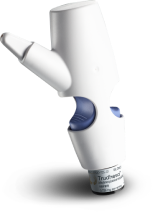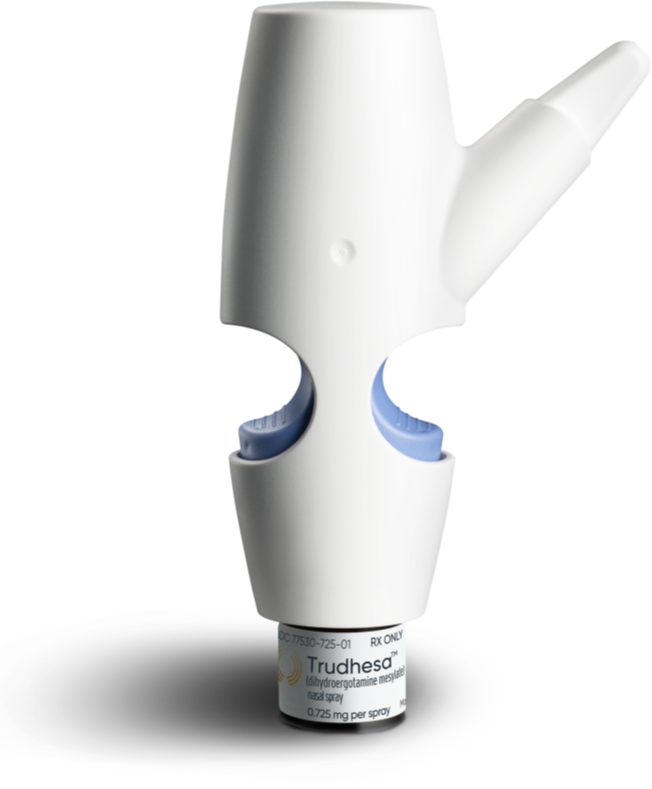
Trudhesa® is the only migraine treatment that uses high-tech POD® technology to deliver trusted medication to the upper nasal space.
Lauren Natbony, an MD with migraine, counts on Trudhesa for relief
Lauren Natbony is a headache doctor and mom who also lives with migraine. Watch her video to learn how she uses Trudhesa to treat her own migraine attacks and what advice she gives to her patients and anyone with migraine.
You don’t have to stop living your life, because you’re in the midst of a migraine attack, because Trudhesa will still be there waiting for you and it will still work.
TITLE: Migraine Moments
Dr Natbony talks treating with Trudhesa
Intro
I’m doctor Lauren Natbony. I am a headache specialist, and I’m the founder and Medical Director of Integrative Headache Medicine of New York in New York City.
Tell us about a time you treated a migraine with Trudhesa
I recently took my kids to an amusement park. They love amusement parks, and especially love roller coasters. So I went with them, on a really twisty, windy roller coaster, and I immediately felt nauseous right, coming off I’m like oh I think I might just throw up, and then I felt the migraine starting. It’s like creeping in there. And I’m like OK, I’m going to be OK, right? Just going to drink some water, have some caffeine, eat something, right? Because I’m probably just dehydrated. I said that to myself, even though I know I’m a headache doctor, right. I know I should be taking something. And then I realized I’m gonna miss out on this whole day with my family. I should just take something.
So went into my bag, had some over-the-counter medications which I took and yeah, it kind of dampened things maybe, maybe a little bit. I was able to get through a few more rides, not-not the spinny ones, but some of the other ones.
But I knew that it just wasn’t enough. And there’s this show that night that I really want to see. My kids have been waiting and waiting to see it, and I know I have Trudhesa. It’s there it’s in my backpack.
I took it and it was late, it was late into the attack. I spent the whole day in the heat, the whole day nauseous. But was I able to make it to that fireworks show? Yes. Was I able to spend that time with my kids? Yes.
I’m able to be there and be present. And how many of us are so afraid of missing out on life, right? Like so afraid that we’ll do anything, anything, to just be there with our family. That’s what Trudhesa that day allowed me to do. It allows me to treat at any point during my attack, and still be able to live my life, be there with my family, be there with my kids, and enjoy those little moments.
Why do you think POD® technology is better than an average nasal spray
The POD is really easy to use. You don’t have to think about contorting yourselves into different positions to try to get that nasal spray to go right into the perfect spot. When I use a nasal spray I think, “do I need to sniff it?” “does it need to be directed in a certain way?” “is it going to drip out?” “does my head have to lean in this really weird position?” But with the POD, it’s ergonomically designed so you’re sitting upright, it has the part that goes into your nose at a perfect angle, and you just press it and you spray. You don’t have to think about it, just do it and it’s done and you know it’s getting in there and then it’s working.
Why is it so important that you can take Trudhesa late in an attack?
All we’ve been ingrained and told I feel like forever, is you have to treat early, you have like an hour window, you have to take it, take it, take it. You know how much stress and anxiety that puts on a person?
That if I miss that hour window I’m done. I’m finished. What am I gonna do? And that anticipatory anxiety of knowing that I have to treat or I’m going to miss my window can be more anxiety provoking, more debilitating than the migraine attack itself. And I think that by having something that you know there is no window, I’m not going to miss it, there’s no self blame. You take away that self blame that I missed that window, I missed that perfect treatment time. Taking it at any time allows that flexibility, right, like you were skydiving. I’m just putting an example out there, and you have something on you. You can go skydive and then you’re done and then you can take your device and it will still work. You don’t have to miss out on your activities. You don’t have to stop living your life, because you’re in the midst of a migraine attack, because Trudhesa will still be there waiting for you and it will still work.
What's your advice for people living with migraine?
Even though migraine pain might be invisible to those around you, it is one of the most prevalent and disabling diseases out there. And I think it’s really easy to say “you just have a headache” right, just have a headache. It’s not a big deal but it is a big deal, and it’s OK that it’s a big deal. And we have treatment that can help it. So if you are one of those people that are suffering or suffering in silence, please come and talk to your doctor, talk to a headache specialist, talk to someone like me. Because we can help you, we have amazing treatments, as you can see from Trudhesa today, that can really be life changing.
Thank you for watching. For more information, please visit trudhesa.com

When 4515 migraine attacks were treated with Trudhesa in a 24-week safety study, exploratory results showed that for some people, Trudhesa was:
Pain relief can start in as few as 15 minutes*
Pain freedom can last 2 days with just 1 dose*
Designed to deliver relief time after time, even when taken late into an attack*
*Exploratory efficacy outcomes are based on patient reports and post hoc analyses from a phase 3, open-label safety study of Trudhesa.







